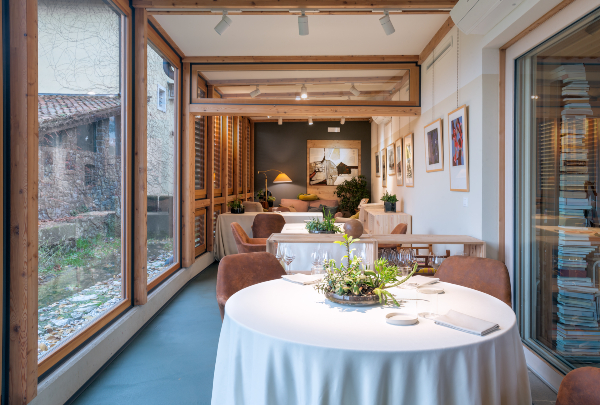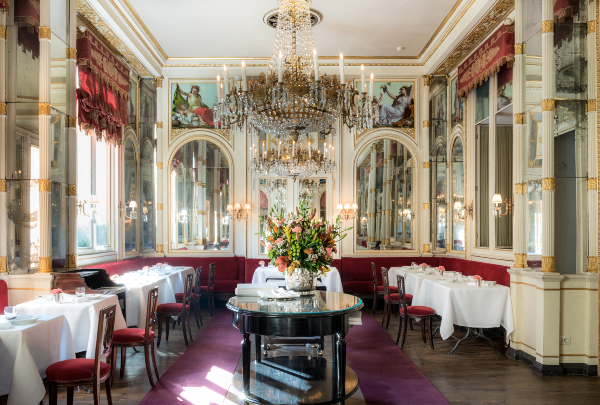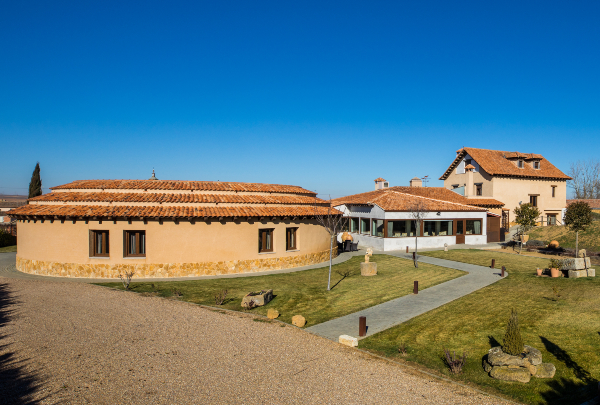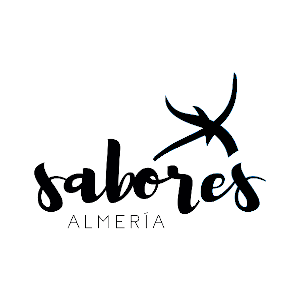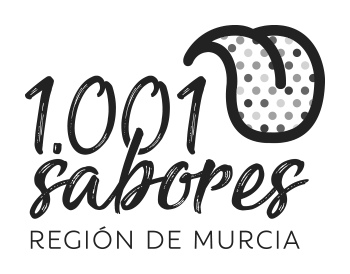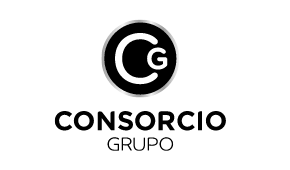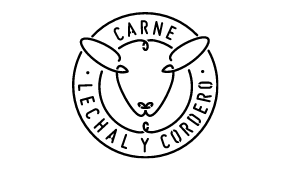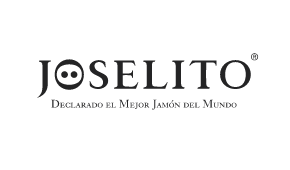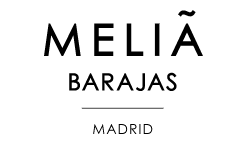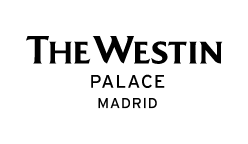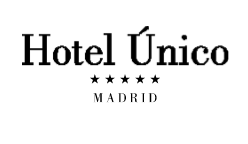Interview
Denise Monroy “The upcoming trend is vegetable cuisine, and that makes me very happy”
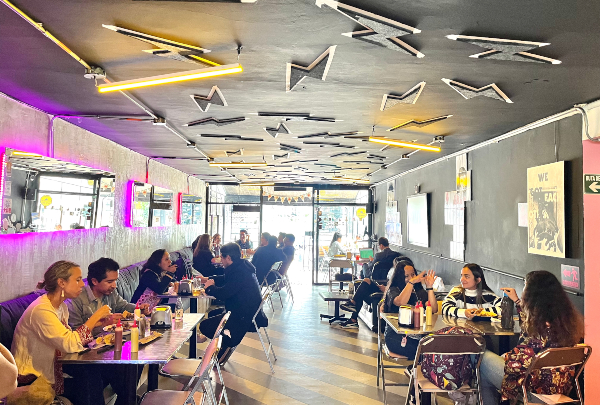
Monroy, the brilliant Revelation Chef at Bogotá Madrid Fusión 2021, will be at the Madrid congress to showcase Colombia's vegetable cuisine.
The day after she was declared Revelation Chef at Bogotá Madrid Fusión 2021, Denise Monroy opened her second Elektra restaurant. A space - now in the northern sector of the capital of Colombia - which changed the paradigm of the country's vegetable cuisine, transforming it into a fun concept, streetwise, tasty and healthy.
In this interview she tells us about how this idea of food as medicine came about, about her research into products and fermentation, the illness that inspired her to become a chef, and the future of vegetables as a gastronomic trend.
How did a photographer get into cooking to improve food?
I'm a plastic and photography artist, and I never studied cookery. I got into it through my eating disorders. I was anorexic, and part of my salvation was cooking, because I needed to use another kind of logic to find myself again, through food. My recovery entailed a reconnection with food through my head and my hands, to comprehend why food was important for my body. That's why I studied nutrition in the Institute for Integrative Nutrition in New York. There I studied and learned, for example, the importance of fats for cerebral and muscular development. One of my most serious health problems was a deterioration in my gut flora. This led me, 12 years ago, to travel to Japan to gain an insight into fermentative processes from the macro and even the ancestral viewpoint. That trip brought about Lácteos no Lácteos [Non-Dairy Dairy Products], a project I used to bring out a number of products such as coconut yoghurt, almond cheese and others, at a time when Colombia probably only had one vegetable milk brand.
Over the last 12 years I've discovered a new world of food, which I'm trying to publicise through cuisine and communication. That's why I work with foundations, or with Carlos Jaramillo, a functional doctor, as a way of taking simple, nutritious, tasty food to ordinary people.
Your cuisine at Elektra moved on to a more commercial offer, seeking to win over a Colombian population that showed reluctance to vegetables. Do you feel you achieved that?
Absolutely. Since gastronomy took off in Colombia, during the boom, vegetables had never been a part of it. They don't eat them, Colombians aren't used to eating them. Despite our huge biodiversity, vegetables aren't part of the country's culinary fare. So Elektra didn't emerge for vegans or people close to that kind of diet, it emerged to bring in people unaware of the power and taste that lie behind the vegetable universe. Elektra changed paradigms, and did away with the stigma that vegetable cuisine is boring. So we managed to convince many non-vegetarian Colombians to eat tasty, fun, vegetable food.
Which recipes show that logic of taste and health?
All the Elektra recipes are like that! But, to give you three examples - papaya ceviche, lemonade with magnesium citrate or coffees with adaptogens are an example of how we quietly introduce some extremely powerful foodstuffs to improve what we eat and offset the deficit of a number of nutrients which, regrettably, we don't pay much attention to, but which are necessary for our health. 70% of the population have a magnesium deficiency, and so we make it part of the diet and try to make this ingredient fun and up close.
There is a direct association between eating healthy and eating better and a higher price. What do you say to that?
Yes, some products are costly, such as adaptogens. Most of them are innovative items, certified and imported, and that makes them more expensive to produce. Some of them are being produced in Colombia now, and that should make them slightly more affordable, but they're still expensive.
The thing is that food should be a balance, and not necessarily have any supplement trappings. My diet, for example, is really simple. No flying saucers there! Grain is a good source of protein and fibre, and green vegetables such as chard are very cheap, but they are a tremendous foodstuff, like eggs, or a lower consumption of dairy products. We have to find a balance and reduce the consumption and cost of unnecessary foodstuffs, and move into others which are much more essential.
In the past, peasants or the indigenous population didn't have to eat so many things to survive. Let's leave aside the other products for people who need to compensate or, because of illness, should really use adaptogens instead of so many medicines. We have to give the most natural medicine a chance.
Elektra is an economic restaurant. The most expensive item costs 22,000 pesos (5.50 dollars). At the end of the day, ignorance takes precedence. Colombia is a biodiverse country, we have a large amount of raw materials, and so with more education we could have better food, and, even more importantly, food that is accessible to one and all.
During the Bogotá Madrid Fusión congress, we kept hearing about better food, being more sustainable and responsible with food, about vegetables, but when it comes down to it, very few menus display a firm, solid commitment. Is vegetable discourse more popular than a recipe based on vegetables?
That depends on the vegetable recipes. A lot of carbohydrates and salads, options based on "papa" potatoes, yuca and maize. And small portions. They're not just low on macronutrients - they're also plain and boring. They're on almost every menu, because they know lots of customers ask for this kind of alternative, but restaurants don't put so much into a vegetable recipe as a recipe with animal protein. In most cases, these are options just to get by.
Your award as revelation chef at Bogotá Madrid Fusión confirms that your work is relevant. Are things changing for vegetables in gastronomy?
Totally. Eleven Madison Park changed the focus to vegetables, and many other female and male chefs are veering off in that direction to give these products their space, not only because of environmental concerns or responsibility, but also because of their taste, variety and gastronomic creativity.
Cookery goes through cycles. We go from local cuisine, cooking with local produce to sustainable cookery, and we put it into the discourse and action taken by our restaurants. The upcoming trend is vegetable cuisine, and that makes me very happy.
You will be at Madrid Fusión 2022, probably the world's major gastronomy platform. Can you give us a bit of an insight into your talk?
It's so cool to have the chance to demonstrate my knowledge and experience about how we can transform ingredients and take care of our health. My cuisine is based on an understanding of cookery as your medicine. It's based on more than 12 years of research and development of non-dairy dairy projects, and on working to combine taste, fun and nutrition in a single recipe, using street food or haute cuisine. That's the different, punky, healthy food, democratic and participational, we'll be talking about in Madrid.

